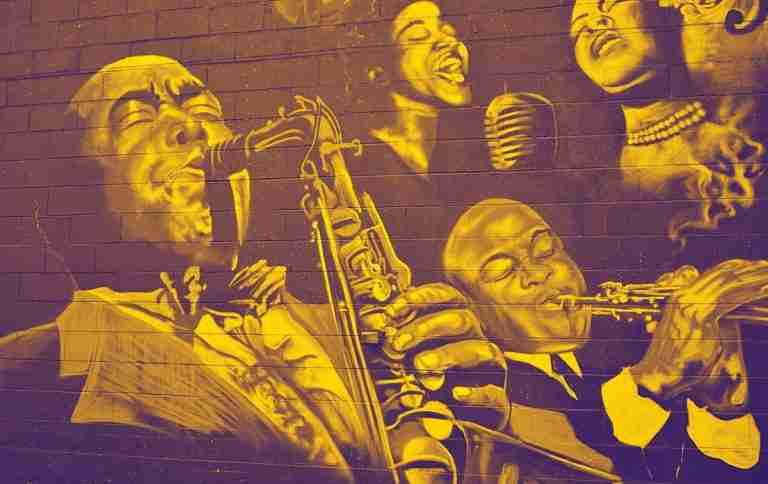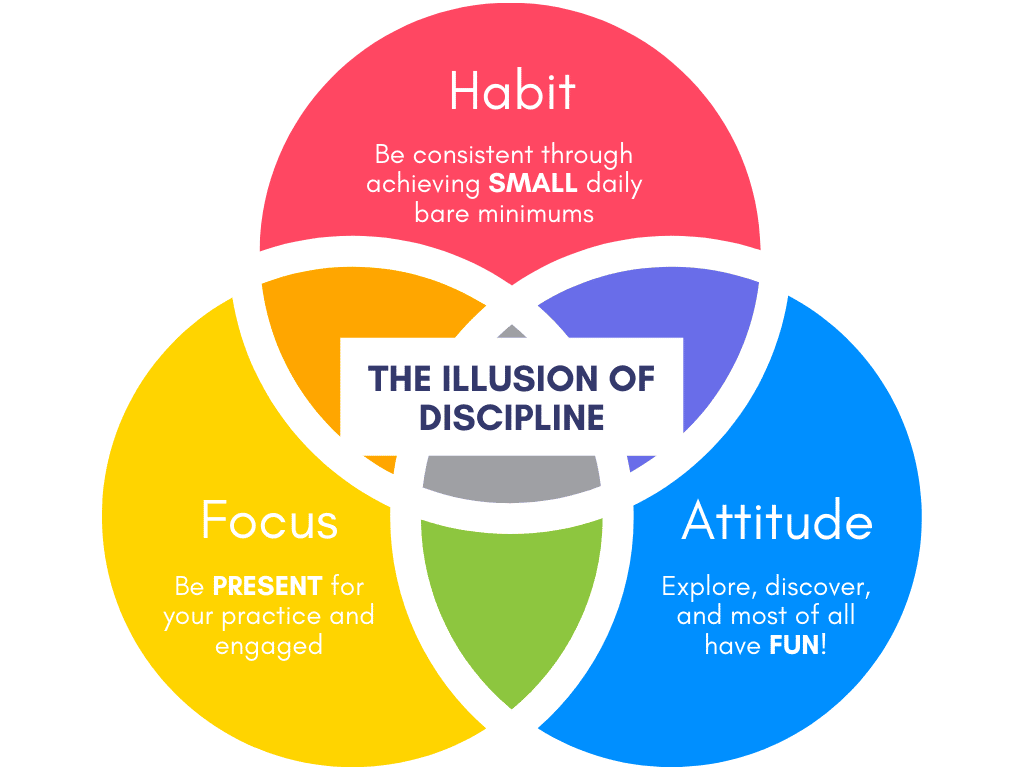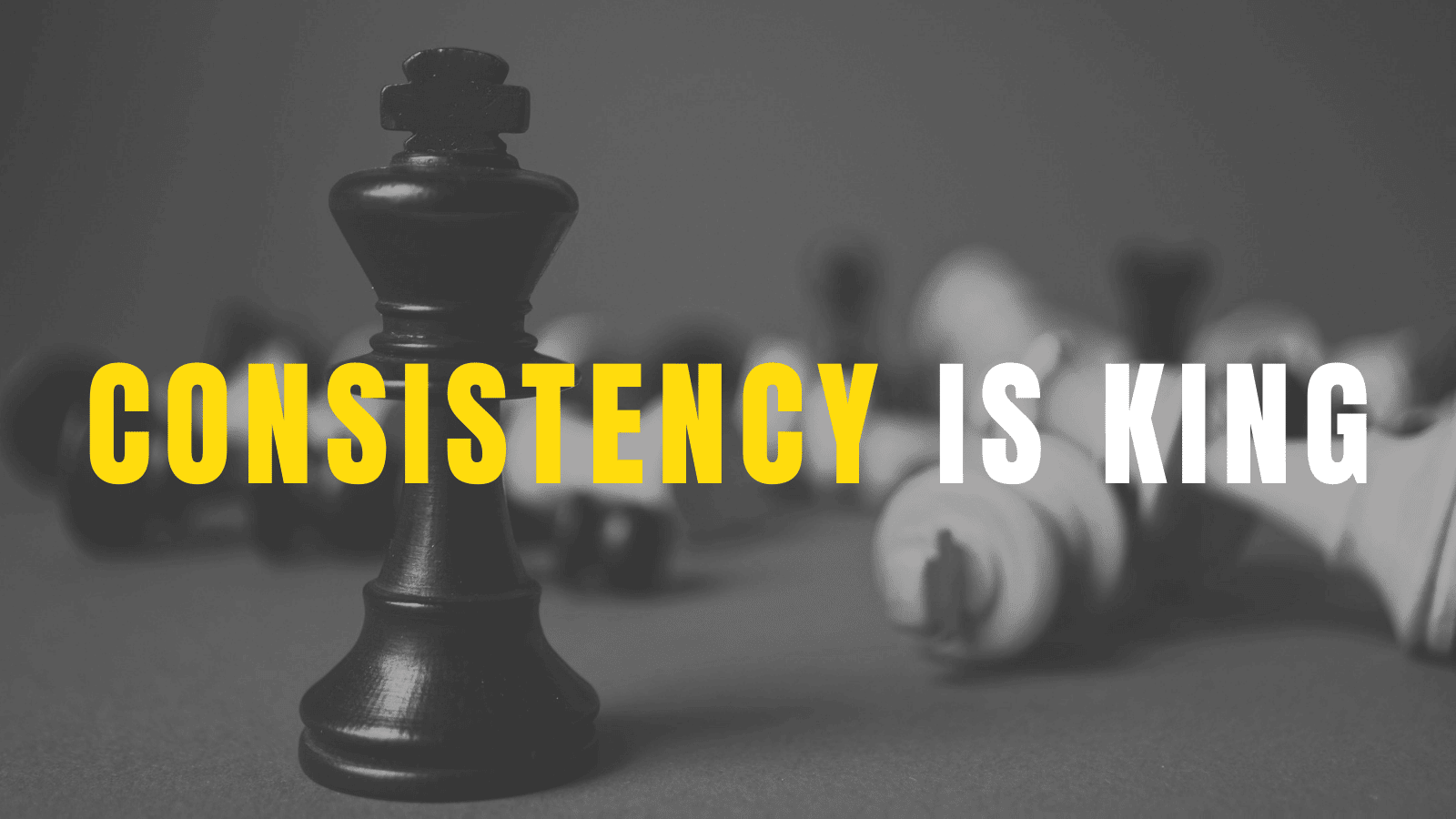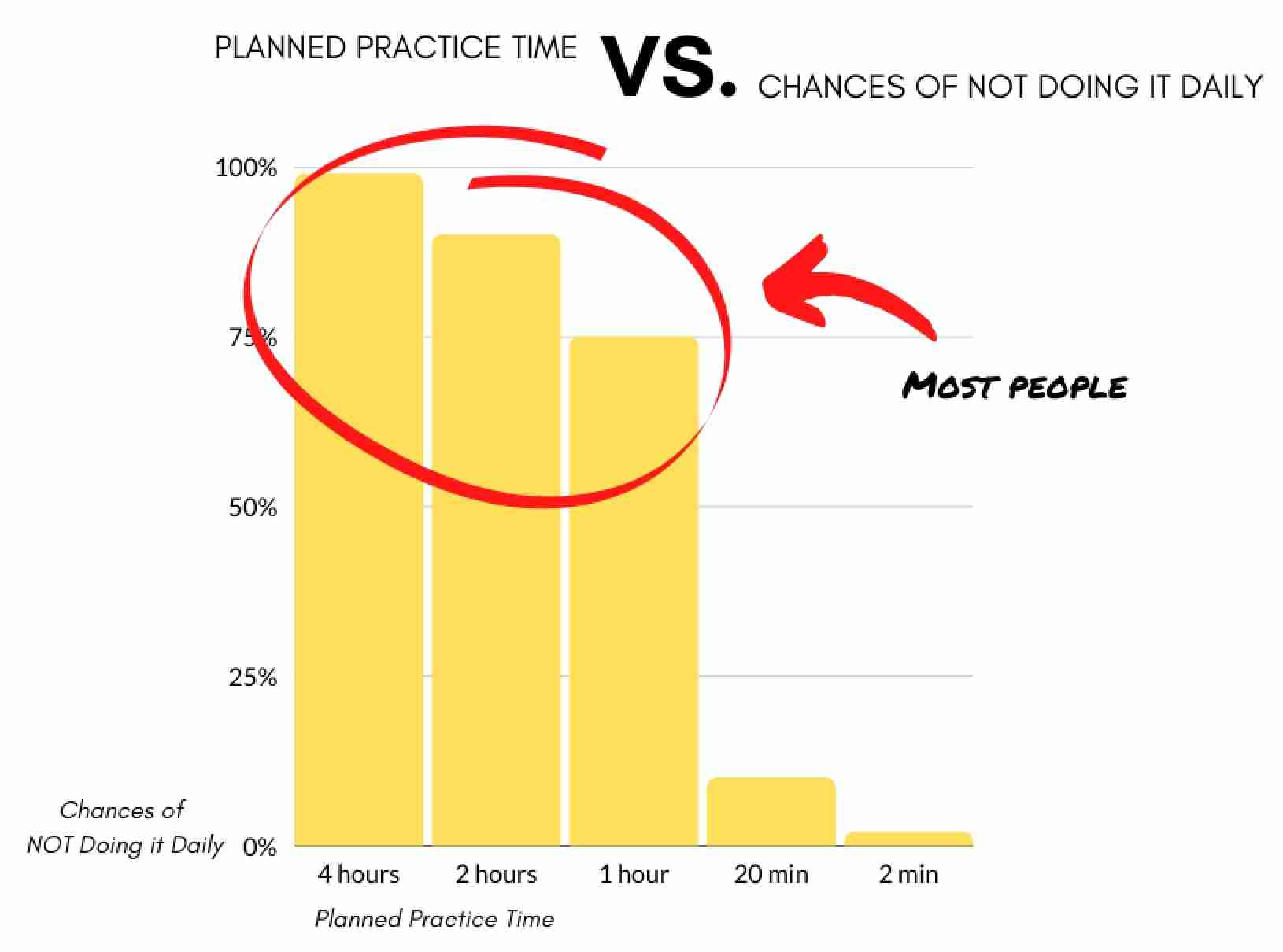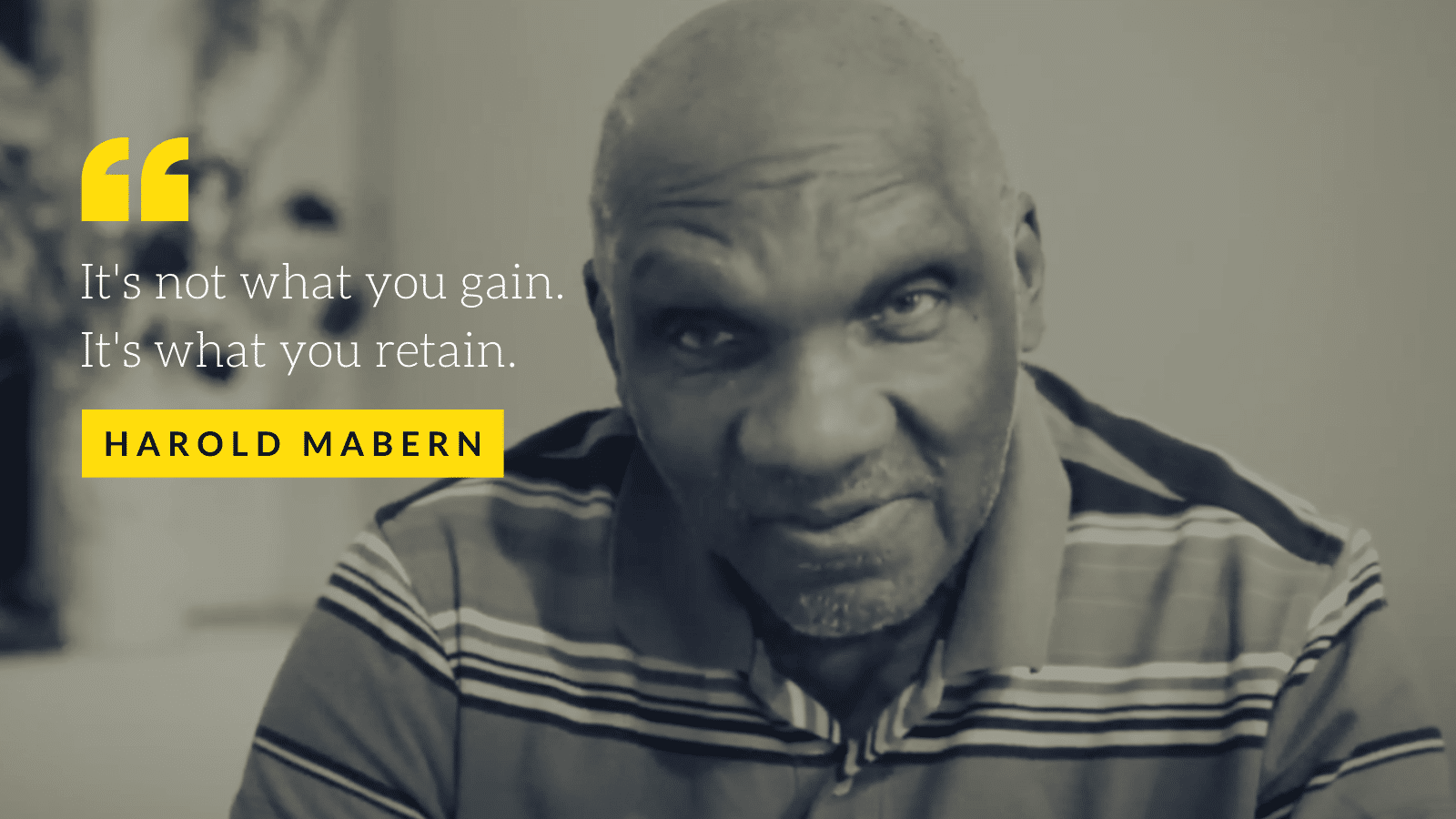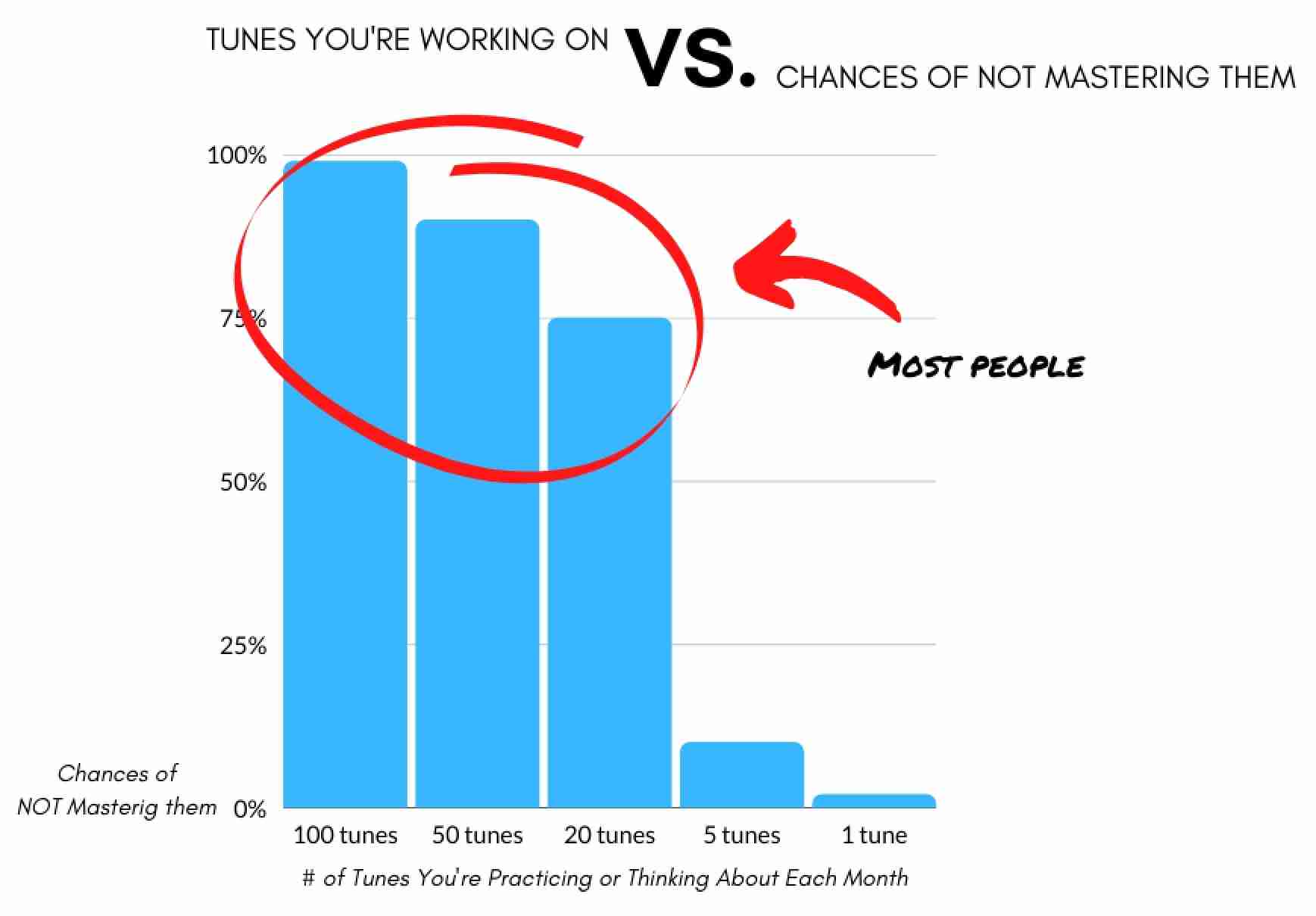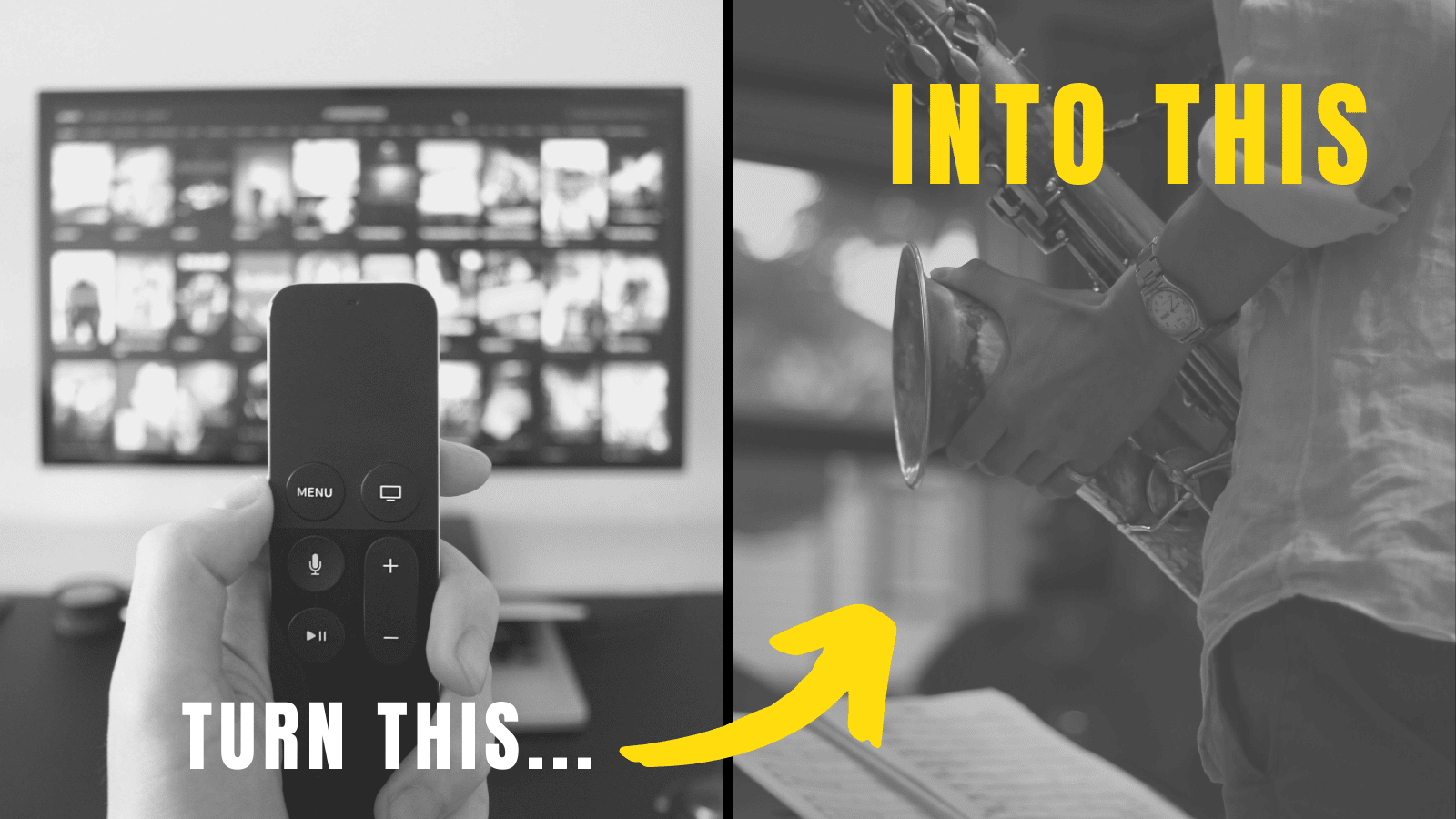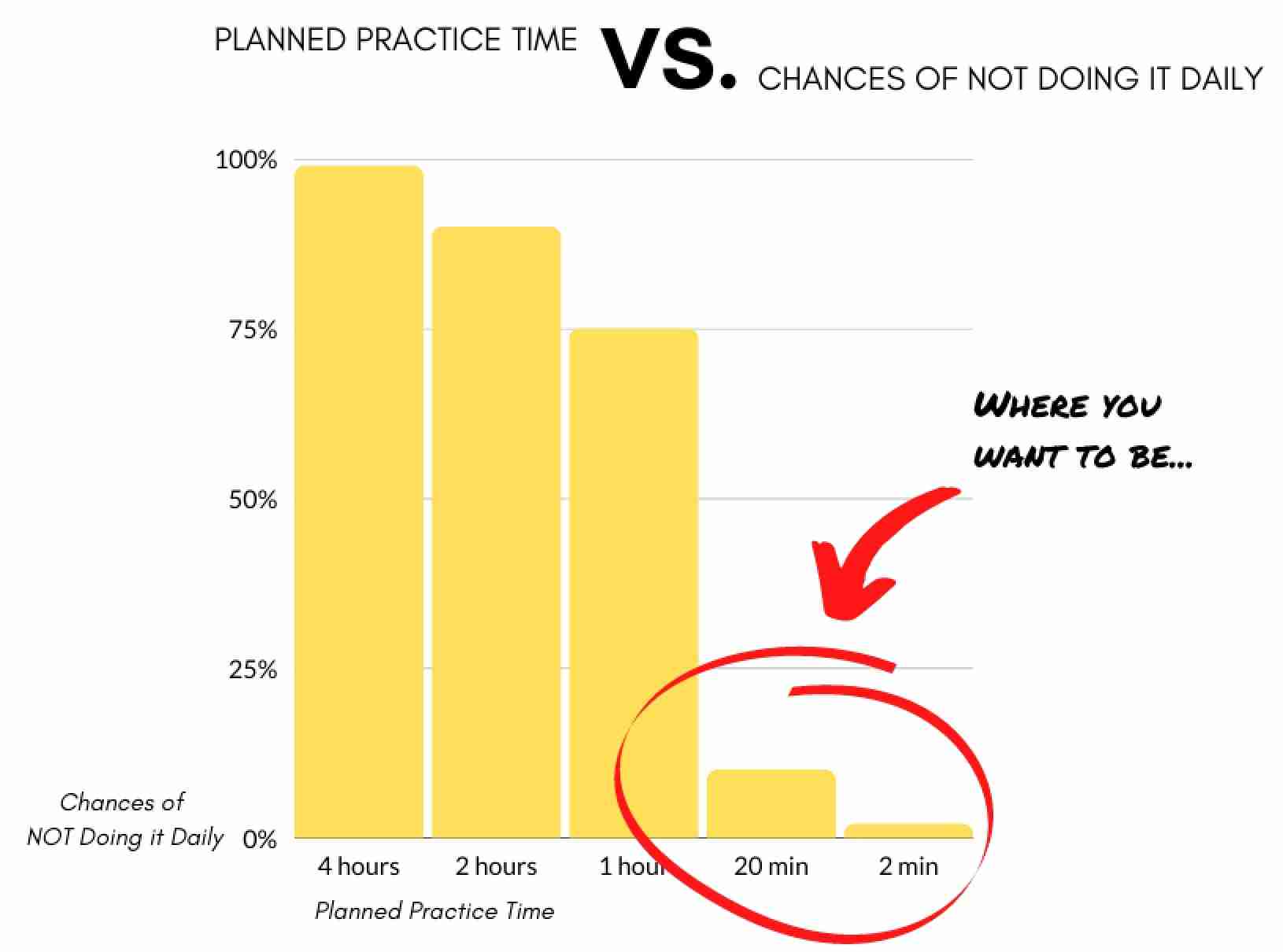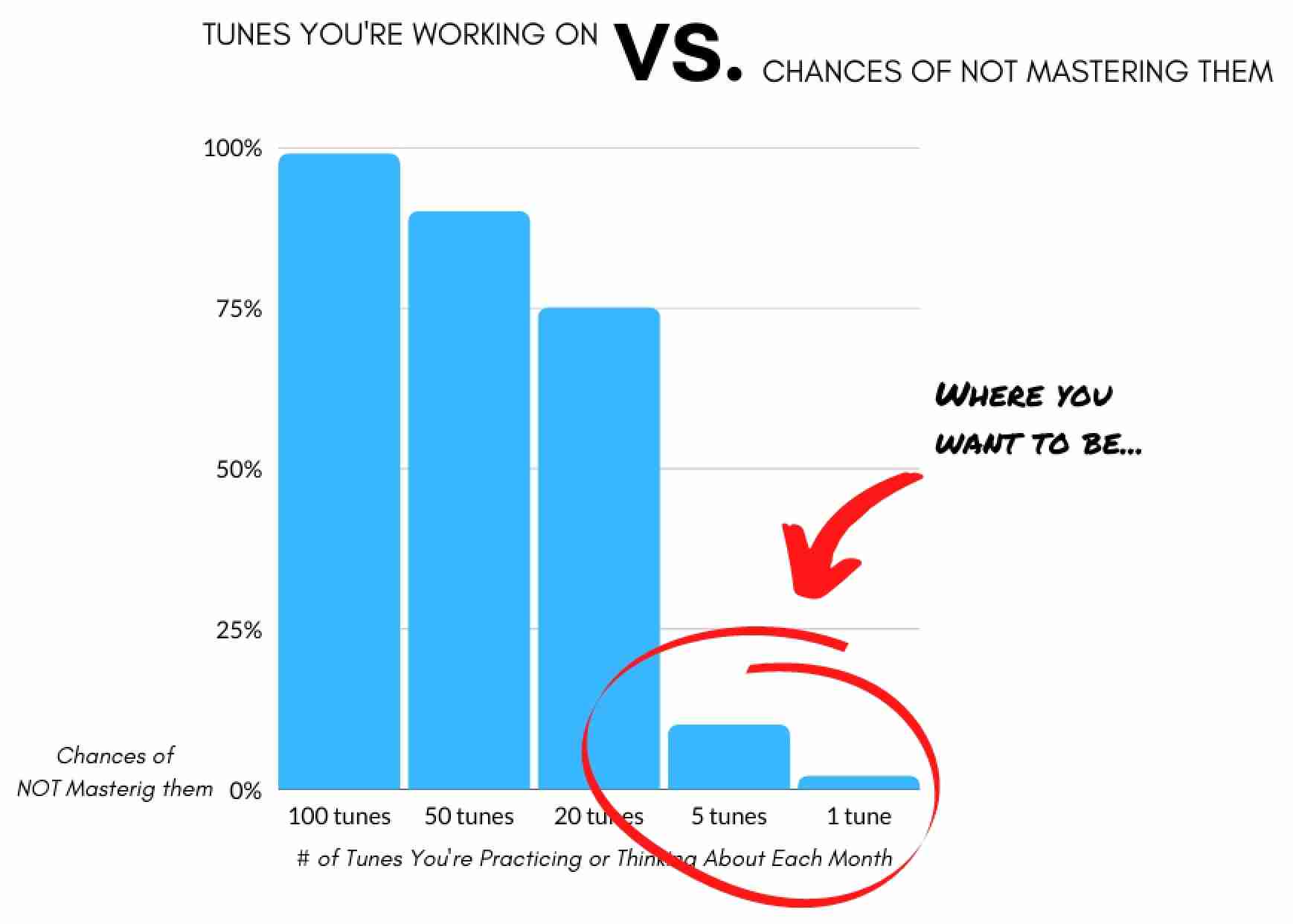To an outside observer, I look like a disciplined person. The kind of person who works hard and puts the time in to move forward on their goals. And to some degree this is certainly true. I strive to be better, I’m motivated, and I tackle challenges on a daily basis to move closer to my ideal…
But if I’m being completely honest, I’ve never felt like a “disciplined person” and would never attach that description to my personality.
I binge watch Netflix, I’m obsessed with Youtube, and social media is no stranger to me. On top of all this, I don’t have the best time management skills, I love to go out and socialize, and I’m by no means a morning person…
But even without waking up at 5am or practicing 8 hours a day, I manage to continually make progress in music and everything else I set my mind to.
And it’s not that I’m special, it’s that I’m thinking about daily practice and discipline in a completely different way than you’ve probably grown accustom to.
So what’s the secret to discipline that no one seems to get?
The illusion of Discipline
Here’s the thing about discipline…
Discipline is an illusion – it’s the end result of a simple process that involves:
- Attitude
- Habit
- Focus
And while these 3 words sound very much like discipline, they’re a whole lot simpler and more direct to put into practice than trying to become a super disciplined person, whatever that means…
With the right mindset, you too can put this illusion of discipline to work in your life and grow into the musician you wish to become.
Here’s a quick overview of what we’re about to get into…
Of course, you might be looking at this and thinking, “Habit? Consistency? Focus? That sure looks a lot like discipline to me…”
But I assure you…
The model we’re going to explore today is quite different than the standard disciplined approach to practicing music we’re all accustom to and if you give it a chance, you’ll completely transform your playing in a short amount of time.
However, before we get into these strategies, let’s first dive into why most people continually fail in the first place.
How You’re setting yourself up to fail, Part I
When musicians start to architect their daily practice plan, they usually begin with a large chunk of time.
They start by saying…I’m going to practice 4 hours a day, or some other substantial amount of time…and from there, they schedule how they’re going to move from topic to topic.
From what they’ve been told, all the great players practiced endlessly, so it makes sense to them that scheduling and committing to a lot of practice time must be the answer, that if they simply put in this required time each day, they’ll magically transform into the greatest player they could ever imagine.
But it doesn’t quite work like that…
While growing into the musician you wish to become does take a lot of practice time, the idea of structuring your practice from a large chunk of time outward isn’t necessarily the best way to achieve your hopes and dreams.
Here’s why – the key to success is consistency which means practicing every single day. We’ll get into this much deeper in a bit…
I see this all the time…
A student gets super excited, has tons of motivation, writes out a 4 hour practice plan, commits to doing it daily, goes into the practice room and has a good session.
But what happens the next day?
Their motivation isn’t quite happening like the previous day, so they push through, committing to the 4 hour plan that they’ve set for themselves after all, this is the magic formula for success, or so they think.
By the third day, they’re seriously reconsidering the practice plan they’ve set for themselves. There’s no way they can keep up this crazy 4 hour schedule every single day, but they stick to it.
As they continue over the next couple weeks, it gets more and more difficult to keep up with their plan. They feel their motivation slipping, they feel overwhelmed, and practicing turns into a chore…
This common scenario demotivates talented musicians every single day. They’ve set themselves up to fail by tying their success to an arbitrary crazy large expectation.
This visual should help clarify how ridiculous this notion is and why you’re pretty much guaranteed to fail with this approach to practicing:
Now keep in mind, I assigned theses numbers based upon my own experience playing and teaching, feel free to vary or change them however you see fit, just make sure you understand the point…
The more time you pre-plan and force yourself to play each day, the heavier the expectation you put on yourself and the greater the chances of not doing it daily.
Planning your practice around a large chunk of time has devastating effects on your daily motivation
This is what happens…
Whether it be an hour, two, four, or whatever, every time you’re about to go to the practice room, your brain will go straight to thinking about how you have to complete this large chunk of time to create a “successful” session.
On many days, you’ll struggle to even start practicing, psyching yourself out before you even begin – Your health and mood vary. Excitement and inspiration changes. Your family and work responsibilities add up.
These are the realties of life. Everything is in constant flux, yet this typical practice approach structured around a large chunk of time doesn’t account for living in the real world.
So the greater amount of pre-planned time you set for yourself, the more difficult it is to find daily motivation, and the greater the chances of not accomplishing it every single day.
If consistency is king, you’re setting yourself up to be the court jester. And unfortunately, this isn’t the only way you’re setting yourself up to fail…
How You’re setting yourself up to fail, Part II
Not only do most jazz improvisers tend to force themselves to stay in the practice room at any cost, they also try to tackle way more information than humanly possible at any given time.
Whether it’s the amount of tunes they’re trying to learn this month, the number of jazz books they’re working from, or the number of solos or lines they’re working on, it’s usually way more than any one person can hope to absorb at any one time.
And If you haven’t deeply internalized what you practice and aren’t able to use the information in a creative spontaneous way, then it’s not going to be much use when you try to take a solo.
Like Harold Mabern would constantly tell us, you can’t take your books and notes on the bandstand – only what you can retain in your head.
When I was younger, I was oblivious to this idea of retention, in fact, I bounced around in my practice as if I were playing pinball…
Every single night, I’d carry dozens of books, a bunch of play alongs, piles of CDs, speakers, and the kitchen sink to the practice room!
I’d spend hours there jumping from book to book, one exercise to another, one tune to the next. It sure seemed like I was putting in the time and practicing hard.
But what I couldn’t realize was that by bouncing around, I didn’t internalize any one thing to the point where it was effortless. I skimmed the surface on so much…
Even though it doesn’t work, this idea of going from topic to topic is how most students have been taught to practice.
For instance, most improvisers attempt to learn dozens of tunes at a time, jumping from one tune to another in their daily practice. They scratch the surface on many rather than mastering one.
And this is where the problem lies because everything you learn in jazz is a cumulative process. What you learn tomorrow builds on what you learn today.
By shortcutting the process, you never gain the necessary mastery over any one thing to build upon it. So, all of this practice time spent quickly learning as many tunes, lines, or solos as possible, jumping from one thing to the next turns into short-term superficial gains with nothing permanently retained.
What most people don’t realize, and what I didn’t realize back then, is that a single tune mastered will take you much further than trying to acquire a bunch of tunes as quickly as possible because it gives you something to build on.
Every single tune is 10 tunes in 1 because the exact same elements are repeated from one tune to the next. Master one, master many.
If you master one tune, then when you go to work on the next tune, you’re not starting from scratch. And then on the third tune, you’ll have even more to build on…by the tenth you’ll have mastered nearly all the essential elements that jazz standards are built upon.
Yet we all seem to get caught by the trap that more is better. Falling for traps like this is a surefire way to set yourself up to fail.
But you don’t have to be like so many unfortunate jazz improvisers making these mistakes time and time again. Instead, you can change your outlook and learn how to set yourself up for success. The choice is yours.
And it all starts with a new attitude…
Step #1: Adopt The Attitude of an Explorer
So if locking yourself in the practice room isn’t the answer, what is?
Here’s a hint…
Have you ever had those days when you’re practicing where you don’t want to stop? Where you’re just having so much fun you can’t put your instrument away and you’re super curious about what you might discover next?
The attitude you have on days like this is the key to unlocking your practice power. An attitude of discovery, exploration, open-mindedness, and fun.
You feel like Marco Polo, sailing into the depths of the unknown, looking for new lands, new possibility…
This attitude and perspective is what makes the things you’re practicing interesting, and when things are interesting, you’ll naturally spend more time on them. You won’t need an artificial 4 hour time allotment that you’re forcing yourself to complete, and you won’t have to adhere to any strict rules.
The goal is to want to be practicing at the exact moment when you’re practicing
You can’t force yourself to practice, you have to want to, and this only comes from an attitude of discovery, not from one of discipline.
Over the years I’ve learned to love practicing, getting into the little details, taking things through all keys, working on the tricky measure of a tune. It’s this nitty gritty stuff that you have to learn to love.
You have to turn practicing your instrument into something that’s as entertaining and enjoyable as watching a movie, or hanging out with friends, or whatever you like doing.
When you have this attitude, you’ll never want to put your horn down.
The next time you find yourself out with friends or binge watching Netflix, and you keep thinking “Man, I just want to go practice right now,” you know you’re starting to develop the right attitude.
Practice is becoming something you actually want to do and are constantly excited about. Stay curious. Stay interested. Be greedy for the music. This is the attitude that keeps you practicing for hours, not some arbitrary time allotment or self-imposed discipline.
Step #2: Develop a Habit of Meeting Daily Bare Minimums
So instead of setting yourself up to fail, why not set yourself up for success?
Once you’ve adopted this new exploratory attitude, the next step is to overhaul how you think about your daily practice plan so you’re not continually setting yourself up to fail each day.
Hands down, the most important things when it comes to crafting your daily practice plan are what I call the Two Cs:
- Consistency – How often do I practice?
- Content – What do I practice?
For consistency, as we’ve mentioned before, the goal is to practice every single day or perhaps every weekday to allow for some flexibility in your life.
And in terms of content, the goal is to highlight a small amount of information during each practice session in order to make meaningful, permanent gains.
So how might you architect your practice plan to promote consistency and encouragement to go deeper into the content of what you practice?
Well, rather than pre-planning hours in the practice room and scaring yourself off each day, move to the other side of the spectrum. Pre-plan a very small amount of time, make it easy to complete from day to day, even during those days that you don’t quite feel like it.
And for any content you practice, the specific example in this diagram being tunes, rather than planning on learning everything you think you should know, choose a very small amount of information to master that you can build upon.
Each day, week, or month, zoom in on just a small manageable amount of information— this is different for everyone and it will certainly change as you progress. When in doubt, focus on less, not more….
These zones become the bare minimum that you’re going to hit every day, and with them, you’re setting yourself up for success, not failure.
This is a huge shift in how you architect your practice…
You build your practice plan from the absolute bare minimum of what you want to accomplish each day, not from the ideal or the maximum
Here’s how this idea might look in practice:
- Consistency – Every day this week, Monday through Friday, I’ll commit to practicing 5 minutes (or 10, 15, or 20, but keep it small)
- Content – I’ll focus on one single Charlie Parker line that I transcribed
But wait a minute…
I can hear you saying…5-20 minutes a day? A single topic?? How am I ever supposed to get better with such little practice time??
Here’s the magic of the bare-minimum-mindset and the big thing you need to realize: It gets you started.
Making the daily decision to pick up your instrument and practice is the biggest obstacle to overcome
And once you get started, your explorer attitude that you cultivated earlier does the rest…here’s how it works…
If you know in your head that to meet the daily requirements that you’ve set for yourself, all you have to do is play one thing for 5-20 minutes, you’re going to get yourself into the practice room and do your work.
It’s the opposite of what we talked about earlier where any time you’d think about practicing you’d shutter at the responsibility ahead of you…
But if you think about practicing and you don’t have hours looming over you, but just a mere 5 or 10 minutes, your brain is like, Ok, sign me up…that’s nothing. I got this.
And then, here’s where the real magic happens…
9 times out of 10, you complete your bare minimum plan, making fast and direct improvement on whatever it is you’re working on…and then your curious explorer attitude kicks in: You want to keep practicing…
You go deeper into the information you’re practicing.
You take it into a new key. You add on to it. Take something away. Combine it with another concept or line you’ve been working on. Morph it. Shape it. Change the rhythm. Make the harmony more complex. Make the harmony simpler.
Change the phrase to an upbeat. Add pick ups. Change the articulation. Change the direction. Apply it to a tune you know.
When you start developing your practice material like this, you’ve entered a world of endless possibility!
Just like that, your bare minimum grew to several hours of productive and fun practice. This is what happens when you combine a discovery attitude with the habit of a daily bare-minimum-mindset.
Your bare minimum gets you started, and your explorer attitude keeps you going. These two tools get you practicing daily in a creative way to master a small amount of useful information—they motivate you to be way more consistent with your practice than if you would have set a large daily time requirement.
With this approach, you’ll almost always end up spending a whole lot more time practicing than your predetermined bare minimum, but not because you’re forcing yourself to practice, but because you’re genuinely excited, curious, and having fun in the moment!
You want to be there. It’s subtle, but it works.
And, what’s more, this approach to practice will work despite knowing that it’s a tactic to get you started – Your brain consciously knows that you’re tricking it into getting in the practice room, but that doesn’t even matter. It still works!
This happens to me all the time…
I’ve just finished dinner and want to relax, but I tell myself, “It’s only 5 minutes. It’s only one line that you’re working on. Just go play through it and then you can go relax.”
I get my horn out and start playing the line. One key. Another. I’m half way done. A few minutes later, I’ve taken it through all the keys. Just like that I’ve made progress. I feel accomplished, focused, centered.
But why stop now?
I’m feeling great and don’t want to put my instrument down…so I continue. After a while I glance at the clock and realize several hours have passed, but I was so immersed and involved in my practice that time just flew by.
This is called a state of flow and it arises when you’re doing what you want to be doing, truly enjoying yourself while tackling challenges in a productive and positive way.
With the explorer attitude and the bare minimum mindset, you’re boosting your chances of getting into a daily state of flow during your practice. This state of flow keeps you in the practice room a whole lot longer than you anticipated, while having a whole lot more fun.
But there’s still one more piece of the puzzle to talk about and once you add it to the other two, you’ll be unstoppable.
Step #3: Learn to Put your Focus in Over-Drive
Once you’ve cultivated an attitude towards practicing which emphasizes discovery and you begin to view your daily practice in terms of hitting bare minimums, you’re bound to start practicing more consistently and with a more focused practice plan.
But just because the plan itself is focused doesn’t mean you are…
When I was in school, I’d see student after student hanging out in the practice rooms, on the phone, browsing Facebook, doing homework…Now I’m just as much a procrastinator as the next person, but if you’re like me, the last thing you want to do is waste time.
To stop wasting time, here’s the skill you need to develop…
Short-term laser focus
You don’t have to have incredible concentration. You don’t have to be a super disciplined person as we’ve talked about before…you just have to learn to concentrate on one thing for a few minutes at a time with zero distractions from the outside world.
Laser focus for 5 minutes. Act as if the world does not exist for these 5 minutes…no people, no places, no memories, no phone calls, no homework, no due dates, nothing. Only what you’re working on. That’s it.
Over time your ability to laser focus will grow to 10 minutes or even 20 minutes at time. But it’s not the quantity of time that matters, only the ability to focus on information for a few minutes at a time with no distractions.
Make every minute of your practice time count.
Turn OFF your cell phone, no email, no text, no social media. Just you and your practice. Then, Turn ON your hyper-focus.
Know what you’re practicing, why you’re practicing it, and act as if the only thing in the world is the single thing in front you
As we talked about before, don’t jump around from topic to topic, from one tune to another, or one book to the next. Focus on one thing – try architecting your practice plan for the whole week around a single topic.
It might not sound like much, but this strategy will give you the needed space to explore what that topic has to offer.
Here are a few ideas for weekly themes you might focus on:
- A Specific Chord – Work on dominant chords for the week, or altered dominants, major chords or minor. Any chord that’s giving you trouble.
- A Piece of a Tune – Pick an A section or just 4 bars. Many times you’ll find when you’re learning a jazz standard that if you can iron out the little pieces, the whole tune easily falls into place.
- A Transcribed Line – A single line from any of your heroes is bound to contain a great wealth of knowledge. Spend the week splitting it into different concepts and learning to use everything your hero is doing.
As you explore your topic of the day or week or month, apply your laser-like focus and occasionally, take small breaks. Give your mind and body a rest. Drink some water. Meditate. Breathe.
No distractions. Don’t check your phone. Keep a relaxed and focused mental space and stay with the moment you’re in. Be present. Be mindful.
Use your break time to contemplate the information you’re working on and letting it soak deeper into your musical being rather than mentally transporting yourself somewhere else by picking up your phone or letting your mind drift.
And then, after a few minutes, get back to being hyper focused.
This is how you want to spend each minute of your practice time. You can take longer breaks. You can make your focused sessions less than 5 minutes or more than 5 minutes. It’s all up to you…but when you’re practicing, be super focused and get rid of all your distractions, even during your breaks.
Being in the practice room is not the time to talk to your friends or think about what you want to do this weekend – it’s about becoming a better musician.
You dream about the musician you want to be…the practice room is where it becomes a reality. Make every second count!
Discipline for musicians
By now you should realize that the idea of forcing yourself to practice for hours and hours a day is not the pathway that will lead you to consistent, productive, efficient, meaningful, or fun practice.
And that a better way to practice comes from changing your attitude, habits, and focus. Remember:
- Adopt the attitude of an explorer
- Build the habit of reaching a daily bare minimum
- Use laser focus when you practice
It’s all about making small consistent daily gains on practical information. Come up with your bare minimum practice plan for the day or for the week, and do it every day.
On the inevitable days you don’t feel like practicing, tell yourself, “just go do my 5 minute practice plan. If I do it, I’ve checked off what I need to do today. If I want to practice more, that’s always an option….”
You’ll surprise yourself time and time again how well this works to get the ball rolling and what you can achieve once you get yourself started…
And remember how everything ties together:
With this new approach, you’ll:
- Move forward every single day toward the player you want to become
- Keep your practice focused on very specific practical information
- Gain mastery over and retain anything you practice
- Motivate yourself to practice daily even when you don’t want to
Meanwhile, all your friends and family will think you’re so disciplined, practicing every single day and loving every minute of it. Little do they know that discipline has very little to do with it – that you’ve actually developed an unstoppable mindset toward how you approach your practice.
If you want all this and more, give the ideas we talked about today a shot and experiment with what works for you.
Set yourself up for success and enjoy the daily journey moving forward on your musical goals!
